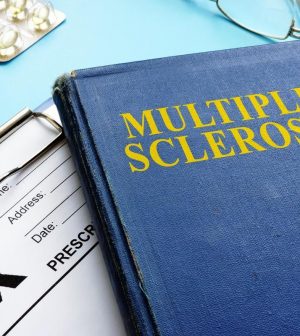- Could Your Grocery Store Meat Be Causing Recurring UTIs?
- Are You Making This Expensive Thermostat Error This Winter?
- Recognizing the Signs of Hypothyroidism
- 10 Strategies to Overcome Insomnia
- Could Artificial Sweeteners Be Aging the Brain Faster?
- Techniques for Soothing Your Nervous System
- Does the Water in Your House Smell Funny? Here’s Why
- Can a Daily Dose of Apple Cider Vinegar Actually Aid Weight Loss?
- 6 Health Beverages That Can Actually Spike Your Blood Sugar
- Treatment Options for Social Anxiety Disorder
Kids From Poorer Homes May Have Worse Outcomes If MS Strikes

A child from a poorer neighborhood is more prone to severe illness once they develop multiple sclerosis (MS) compared to children growing up in more affluent areas, new research shows.
The study of 138 MS patients who’d been diagnosed before the age of 18 revealed that kids from less advantaged neighborhoods showed larger volumes of inflammation and brain tissue loss, compared to those from better-off locales.
“Our findings suggest that social disadvantage in childhood can have lasting effects on MS severity,” said study co-author Dr. Kimberly O’Neill of New York University Grossman School of Medicine in New York City.
“Childhood is a critical time for exposure to environmental factors associated with increased susceptibility to MS, such as passive smoke, pollution and low sunlight exposure,” she explained.
The findings were published Nov. 27 in the journal Neurology.
As O’Neill’s group noted, MS is rare in kids: Just 5% of cases arise before the age of 18. The children in the new study had all been diagnosed for at least four years prior to joining the investigation.
All of them underwent brain scans looking for MS-linked brain damage.
According to a journal news release, the researchers also collected data on “self-reported race and ethnicity, type of health insurance, parents’ education level, and the degree of neighborhood advantage or disadvantage.”
Of those items, relying on public health insurance (rather than private) was most strongly linked to a child having more MS-linked brain inflammation and tissue loss, the researchers found.
A reliance on public insurance was also tied to more inflammatory lesions in the brain’s white matter.
These children also had greater “black hole volumes” in the brain — a sign of loss of brain tissue that’s irreversible, according to the study authors.
Why such stark differences based on a family’s source of insurance?
O’Neill’s team said the difference wasn’t due to how quickly a child was seen by a neurologist, how soon they began MS medications, or how effective those drugs were in slowing the disease.
“This suggests that access to health care does not explain the more severe disease burden shown in the brain scans of people in disadvantaged groups in our study,” O’Neill said in the news release.
It’s clear that more research is needed to figure out the root causes of these disparities, she said.
“While these [study findings] are associations and not causes, many of these groups have historically been underrepresented in MS research and our work here is just beginning,” O’Neill said.
More information
Find out more about multiple sclerosis at the National MS Society.
SOURCE: American Academy of Neurology, news release, Nov. 27, 2024
Source: HealthDay
Copyright © 2026 HealthDay. All rights reserved.










